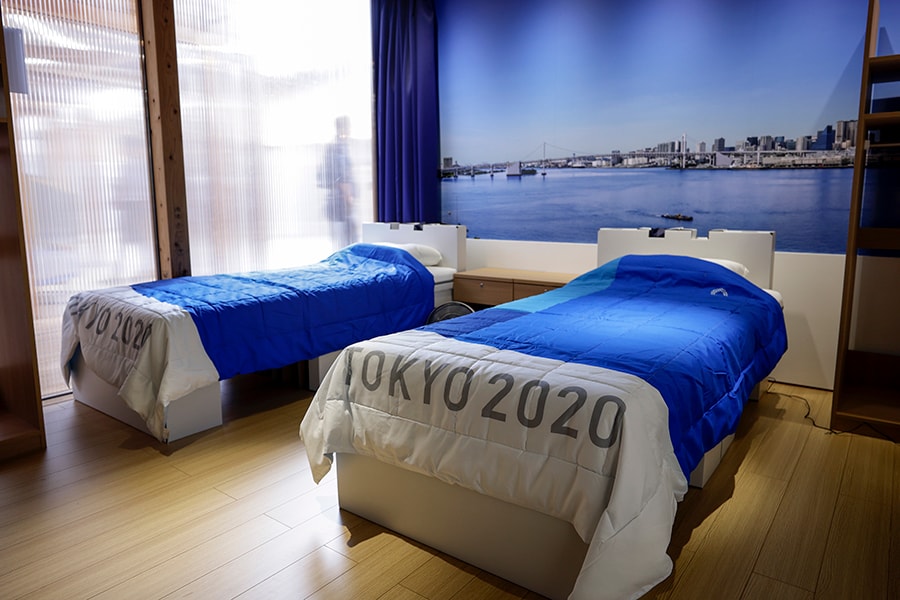Tokyo 2020 organisers threw open the doors of the Olympic Village to the media on Sunday, showcasing virus upgrades including a fever clinic just over a month before the Games begin.
Organisers are in the home stretch before the July 23 opening ceremony, and are trying to build confidence that the mega-event will be safe for athletes and the Japanese public.
On Sunday, they unveiled the dedicated virus clinic, warned that drinking in groups at the village would be prohibited and said a mixed zone for guests had been scrapped.
Warning posters urging anti-virus measures including room ventilation have been placed throughout the mini-city, which can sleep 18,000 athletes and team members during the Olympics and 8,000 during the Paralympics.
The first glimpse of the village since last year"s postponement revealed a virtual city within a city, with everything from a playground and florist to dry cleaners and ice baths for athletes and staff.
The site stretches across 44 hectares of reclaimed land in the Tokyo Bay, with 21 residents towers, a 3,000-seat canteen, a park, gyms and recreation facilities, complete with Nintendo consoles.
Young trees that organisers hope will eventually provide shade during the fierce Tokyo summer dot the otherwise almost eerily empty village, populated only by workers, uniformed guards on bikes and firefighters carrying out drills.
But in just a few weeks, all that will change, with national teams taking up residence and up to 3,000 staff manning everything from stops for autonomous buses to kitchens serving thousands of meals.
Drink alone
The spectre of the coronavirus, which forced the postponement of the Games last year, will hang heavy over the village.
The newly added fever clinic, separate from the main medical facility, will be used to test and isolate people suspected of virus infection or considered close contacts.
"This is just another example of how we are stringently managing matters about possible Covid infections," said Takashi Kitajima, general manager for the village.
Testing will be "the biggest challenge", with about 20,000 carried out each day, according to Tetsuya Miyamoto, an official with Tokyo 2020"s medical services.
Teams will collect their own samples for processing largely off-site by private operators.
Other virus measures include reduced seating for diners, plexiglass shields between gym equipment, and a kit of hand sanitisers and soap to be handed to village residents.
The village will be particularly important for athletes this Games because they are barred from going anywhere else except training and competition venues.
And there will be no partying, officials warned.
"When you drink alcohol, in principle, you are requested to drink alone," said Kitajima.
Recyclable cardboard beds
Competitors can only enter the village shortly before their event and must leave within 48 hours of being eliminated or their competition ending.
Conditions won"t exactly be luxurious, with single rooms of nine square metres (100 square feet) and doubles of 12 square metres (130 sq ft).
Beds are made from recyclable cardboard, but are tough enough to stand up to beefy weightlifters and towering basketball players, organisers say.
Kitajima promised excellent safety protocols, and athletes aren"t likely to face the hot water shortages or dodgy plumbing that have made headlines at some previous Games.
Olympic officials expect most of those staying in the village will have been vaccinated, but the rules apply regardless of inoculation status, and athletes could be kicked out of the Games if they fail to comply.
In a taste of the challenges ahead, a member of the Ugandan Olympic delegation that arrived in Japan on Saturday tested positive for the virus, despite reportedly being vaccinated and testing negative before travel.
The safety measures are set to make for a Games like no other, with overseas fans already banned and a decision on domestic spectators expected as soon as Monday.
Public opposition to the Games appears to have softened in recent days, though a handful of protesters stood outside the village chanting against the Olympics as media toured the site.
A new poll Sunday showed 86 percent of Japanese fear the Games will spark a rebound in virus cases.
After the Games, the village will be transformed into thousands of luxury bayside condos. Around 900 were sold before the postponement last year—some carrying a price tag of 170 million yen ($1.5 million).

 Recyclable cardboard beds and mattresses used inside a residential unit for athletes in the athletes" room replica at Mitsui Fudosan Co. booth in the Village Plaza during a media tour at the Olympic and Paralympic Village for the Tokyo 2020 Games, constructed in the Harumi waterfront district of Tokyo, Japan, on Sunday, June 20, 2021. Athletes and officials at the Olympics will be subject to a range of penalties should they break virus protocols during the Tokyo Games.
Recyclable cardboard beds and mattresses used inside a residential unit for athletes in the athletes" room replica at Mitsui Fudosan Co. booth in the Village Plaza during a media tour at the Olympic and Paralympic Village for the Tokyo 2020 Games, constructed in the Harumi waterfront district of Tokyo, Japan, on Sunday, June 20, 2021. Athletes and officials at the Olympics will be subject to a range of penalties should they break virus protocols during the Tokyo Games.